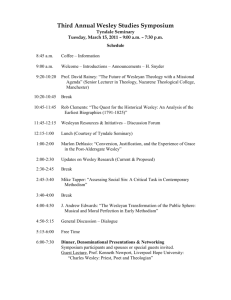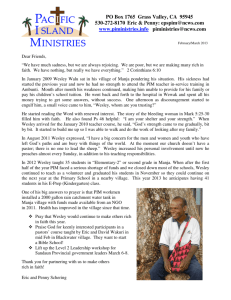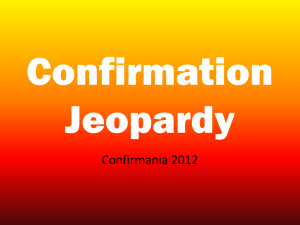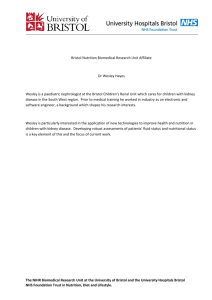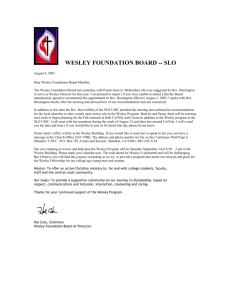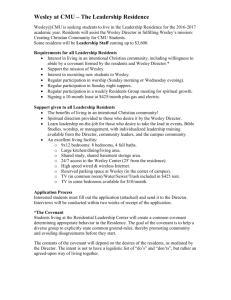PowerPoint
advertisement
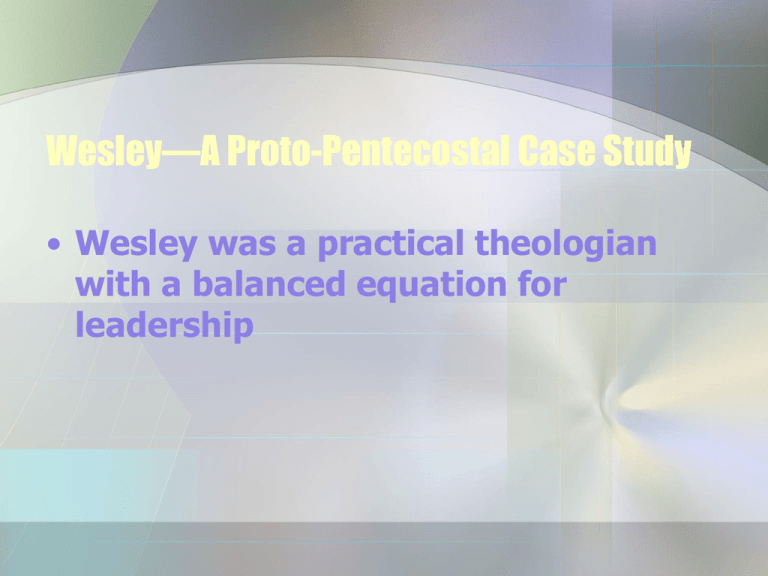
Wesley—A Proto-Pentecostal Case Study • Wesley was a practical theologian with a balanced equation for leadership World of Wesley • A growing empire • A revolution in the “colonies” • Royalty as God’s servant • The Church of England and England as a nation-state joined at the hip The Shaping of Wesley • Epworth • Oxford—Lincoln College • Holy Club (with brother Charles and George • • • • Whitfield) Georgia Missions Moravians Heart Strangely warmed at Aldersgate Street The “vile thing” The Wesleyan Influence • The Church as a community of God’s grace • The Church’s unity is the koinonia of the Spirit • Pursuit of maturing Christian lives sustained by grace is crucial The Wesleyan Method • Outside accepted boundaries, but connected to the center. • The Church is a system of discipline in community: – Class Meetings—once a week to inquire how our souls prosper (house churches, seekers welcome) – Bands/Small Groups—to confess your faults one to another and pray for one another that ye may be healed (had received assurance of sins forgiven) – Select Society —those making progression inward—outward holiness Three Rules of a Select Society • Let nothing spoken in this society be spoken again. • Submit to the appointed minister. • Bring an offering for the “common stock.” Traveling Preachers • Taught to manage difficulties in societies • Face mobs • Brave any weather • Subsist without means • Rise at 4 a.m. and preach at 5 a.m. • Die without fear Daily Rules • • • • • • • Preach Study Travel Meet with bands—classes—societies Exercise daily Eat sparingly Preach nowhere that could not be followed up with organized “structures” with adequate leadership The Primacy of Scripture • “I allow no other rule, whether of faith or practice, than the Holy Scriptures.” • Scripture was the only all-sufficient source commonly available to people for investigating the nature of God and life. • “O give me that book! At any price give me the book of God!” • The personal character of humility and reliance on grace gave Wesley the freedom to see a dynamic interaction between sources to illuminate and enrich biblical truths. This never succumbed to a thoroughly pragmatic approach that reduces truth to relativity. • Wesley affirms Reformation treatise of sola fide and sola scriptura. • However, he interprets sola as “primarily” rather than “exclusively”. • “Tis not enough to have Bibles, but we must use them, yea, use them daily. Our souls must have constant meals of that manna, which if well-digested, will afford them true nourishment.” Rule of Interpretation by John Wesley • • • • Literal sense is emphasized Importance of context Comparing Scripture with Scripture Christian experience has confirmatory and correctional value • Reason is the handmaiden of faith • Practicality—for the plain unlettered people The Authority of Tradition • Wesley’s concern for historical continuity in an age of distrust in Christian tradition. Old Religion Religion—the Bible Religion of the Primitive Church Religion of the Church of England Methodism • Old Religion – John 3:16—heart religion • Religion—the Bible – The only sufficient authority for religious life • Religion of the primitive church – It would be easy to produce a cloud of witnesses testifying the same thing, were not this appoint which no one will contest who has the least acquaintance with Christian antiquity • Religion of the Church of England • Methodism • “If any doubt still remains, I consult those who are experienced in the things of God and then the writings whereby being dead they yet speak. And what I thus learn, that I teach.” • Tradition as authority second only to Scripture. To the extent that the Holy Spirit continued to direct decisions in the early church, Wesley believed tradition was an essential extension of the witness of the Scripture. The Authority of Reason • Desired a religion founded on reason and in every way agreeable to it. Passion and prejudice rule the world…it is our part with religion and reason joined to counteract them all we can. • The image of God persisted in the human race after Adam’s fall, effaced but not obliterated. • Human reasoning was a part of humanity’s original constitution. • Although the heart was prone to evil, the mind was free to reason and respond to God by faith. • An era where the Enlightenment is in full sway. – Natural theology present in the Church of England – Navigates philosophical influences from Aristotle’s rational (scientific) sensory perspective to Plat’s intuition. – This explains his both-and posture integrating the empirical with the experiential and mysticism. • His “both-and” perspective draws criticism from all sides. • Wesley concludes that: – “No man is a partaker of Christ until he can clearly testify the life I now live…I live by faith in the Son of God—revealed in my heart.” Acknowledge Tension • Let reason do all that reason can. Employ it as far as it will go. But, at the same time, acknowledge it is utterly incapable of giving faith, or hope or love and consequently of producing real virtue or substantive happiness. Expect these from a higher source, even from the spirits of all flesh. The Authority of Experience • Considered by many as Wesley's greatest contribution to the development of Christian theology. • “I’m not afraid that the people called Methodists should ever cease to exist…I am afraid lest they should only exist as a dead sect having the form of religion without the power.” “It is necessary that you have the hearing ear and the seeing eye, that you have a new class of senses opened to your soul not depending on organs of flesh and blood to be ‘evidence of things not seen’ as your bodily senses are of visible things, to be avenues to the invisible world, to discern spiritual objects and to furnish you with ideas of what the outward ‘eye has not seen, neither the ear heard.’” • Wesley was deeply concerned about “enthusiasm.” • While he acknowledged excesses, Wesley still believed in the supernatural, immediate gift of God, which “He commonly gives in the use of such means as he hath ordained.” Outward Experiences • Empirical experiences with creation were a source of evidence for religious experience. Inward Experiences • Knowledge derived from a personal experiential encounter with God is objective in the sense if establishing contact with a real, albeit hidden reality. • Wesley believe that the reality of God and of God’s salvation is hidden from our natural senses though not from spiritual senses. • Spiritual senses were created by God and reactivated by His grace that gives potential for discovering religious insights that were previously inconceivable. • The personal conversion experience as well as assurance of salvation are two places people experience a direct awareness of God. • “The testimony of the spirit is an inward impression on the soul whereby the Spirit of God directly witnesses to my Spirit.” • “Now there is properly the testimony of our own spirit even the testimony of our own conscience that God has given us to be holy of heart and holy in outward conversation.” A Heart Strangely Warmed • In the evening I went very unwillingly to a society in Aldersgate Street, where one was reading Luther’s preface to the Epistle to the Romans. About a quarter before nine, while he was describing the change which God works in the heart through faith in Christ, I felt my heart strangely warmed. I felt I did trust in Christ, Christ alone for salvation: And an assurance was given me, that he had taken away my sins, even mine, and saved me from the law of sin and death.” The Wesleyan Quadrilateral by Donald A. D. Thorsen, p. 129 • Experience is the appropriation of authority and confirms the truthfulness of Scripture, tradition and reason. Contemporary Applications of Wesley’s Understanding of Experience • Pentecostals experience the sacred in the midst of the profane, divine guidance for both personal and institutional concerns, standing in contrast to rational and beaureacratic methods, a reticulate organization that refuses to immortalize tradition and the past. In addition, it refuses to routinize the charismata. Margaret Poloma in The AG at the Crossroads • Pentecostals insist that it is not enough for truths—even biblical truths, to be precipitated in the mind and viewed philosophically. There must be a submission to the truth in faith and reverential adoration in worship. This is worship of truth that is not merely imprisoned in the mind, but is personified transcendentally over the mind in the glorious person of Christ. This is an experience—certified theology where an experience of Christ as subject and not just object constitute genuine experience. William McDonald in Perspectives on the New Pentecostalism

